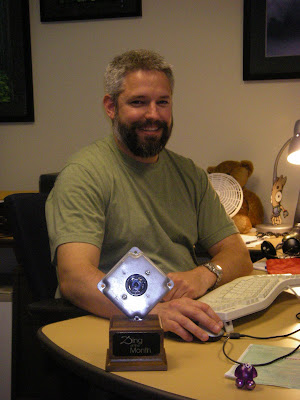One year ago this week, 180solutions merged with Hotbar to become Zango -- the reason that I've been spending so much time over here in Tel Aviv.
Once a month, we have a worldwide company meeting, with our offices in Las Vegas, New York, Montreal, London and Tel Aviv video-conferenced into Bellevue, to listen to Keith or York or Dan try to explain once more about the content economy or whatever the latest issue in need of corporate attention might be. Yesterday, in celebration of our one-year anniversary, the Tel Aviv office presented a video they had created describing what it's like to work with Americans from an Israeli perspective. And it was pretty damn funny, at least to those of us who lived through the integration.
The scenes in the video are exaggerated, of course, but they're only funny because they're based on a sometimes pretty substantial element of truth. It really
is hard for the folks in Tel Aviv to sit on the far side of video conference calls while folks in Bellevue drone on and on, seemingly ignoring them. Sometimes decisions get made in our Bellevue headquarters that are, shall we say, inadequately communicated to Tel Aviv; or worse yet, get made incorrectly because we didn't consult the folks that actually knew. And folks in Bellevue send an incessant stream of lengthy emails (in English!) -- starting right at the end of the Tel Aviv work day -- and then complain when they don't get an immediate response. Like most Americans, we think the world revolves around us. Despite my half-hearted attempts to learn Hebrew, it remains the case that we make everyone else speak our language.
And of course, the folks in Bellevue are sometimes mystified by our Tel Aviv office, starting with the vaunted Israeli love of argument. Israelis are very direct. Hebrew doesn't lend itself to circumlocutions like, "I wonder if, perhaps, you might need to rethink that idea." An Israeli will just say, "You are wrong." If he's spent a lot of time around Americans, he might say, "I
think you are wrong," but that's about as far as it goes. If you say something to an American that he can agree with to any degree whatsoever, the first word out of his mouth will be "Yes", even if it's a "Yes, but...". If you say something to an Israeli that he doesn't support 100%, the first word out of his mouth will be "No". To over-generalize, but only a bit: Israelis are hard-working, smart, creative, and often a bit insecure. They desperately want recognition and, especially, professional advancement. Oren, the former owner of Hotbar, once told us, "We're a nation of over-achievers."
And when you consider that we were originally two separate companies, with different corporate cultures, a 10 hour time difference, different working days (Israelis take Friday and Saturday off), and 25 hours of travel between our main offices: and it's pretty astonishing that the merger has been successful at all. There were just too many opportunities for things to go wrong.
But despite all odds, it has gone extremely well. Most mergers take years to realize revenue synergies, if they ever do: we began seeing them within weeks. Our teams have worked very, very hard to merge our products and our teams, and folks on both sides of the Atlantic have demonstrated incredible patience and goodwill. I've made any number of good friends here in Tel Aviv. I couldn't be more proud of our efforts and our results.












